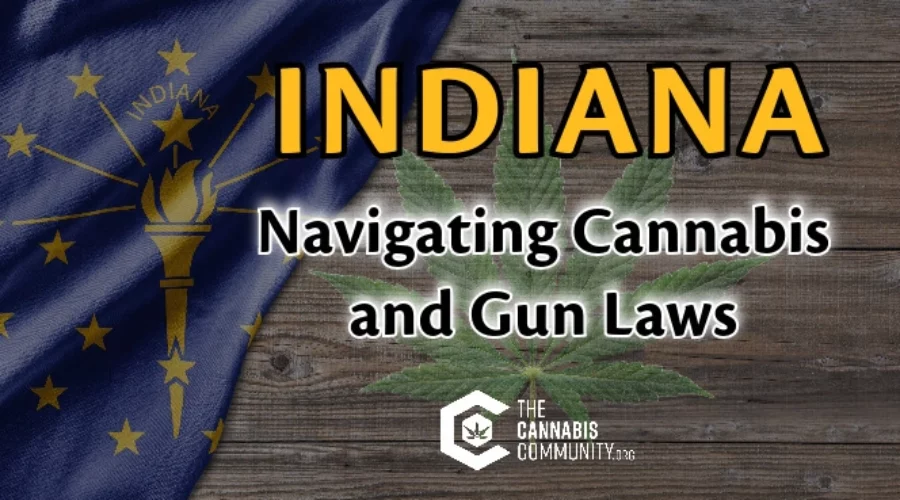Navigating Indiana Cannabis and Gun Laws: What You Need to Know
Table of Contents
Overview of Indiana Cannabis Laws
Indiana’s relationship with cannabis has evolved over the years. The state initially prohibited marijuana sales without a prescription in 1913, and subsequent attempts to decriminalize or amend penalties yielded mixed results. The establishment of the First Church of Cannabis in 2015, along with efforts to legalize medical cannabis, showcased shifting attitudes within the state.
In April 2017, a significant shift occurred in Indiana’s approach to cannabis with the passage of House Bill 1148. This bill marked the establishment of a restricted medical cannabis program in the state, aimed at providing relief to patients dealing with treatment-resistant epilepsy. While Indiana remained sternly opposed to recreational cannabis use, this legislative change marked a pivotal moment for patients in need.
The eligibility criteria for Indiana’s medical cannabis program were very specific. Only patients afflicted with “treatment-resistant epilepsy” qualify, meaning they must have either Dravet syndrome, Lennox-Gastaut syndrome, or another form of epilepsy unresponsive to at least two other treatment options. Physicians recommending patients for the program must be board-certified neurologists, ensuring a specialized approach to patient care.
Within this limited medical cannabis framework, patients could only consume oil extracts that contain 0.3% THC or less and a minimum of 5% CBD. This cautious approach sought to provide potential benefits while minimizing the psychoactive effects commonly associated with THC.
Parents and legal guardians of qualified patients were allowed to act as caregivers, provided they were at least 18 years old. Importantly, patients must be residents of Indiana, preventing participation by anyone visiting from other states.
The Department of Health used to oversee the patient and caregiver registry. Legal safeguards offered patients and caregivers defense against prosecution, although patients could still be arrested in cases covered by the program.
Despite these provisions, the medical cannabis program’s restrictions have prompted criticism. The program’s focus solely on treatment-resistant epilepsy and its limitations on THC content have led some critics to question its overall effectiveness.
In 2018, a significant development occurred in Indiana’s CBD regulations with the legalization of low-THC, hemp-derived CBD through Senate Bill 52. This pivotal change coincided with the federal legalization of CBD under the Farm Bill, albeit with specific conditions attached.
A year later, in 2019, the state took further steps to regulate the hemp industry with the introduction of Senate Bill 516. This bill not only established the Indiana Hemp Advisory Committee but also tasked it with providing guidance on the state’s hemp laws to the Office of Indiana State Seed Commissioner. Senate Bill 516 clarified the legal landscape by addressing the trade, sale, and possession of smokable hemp, designating which activities are possible criminal offenses punishable under the law. These legislative actions underscore Indiana’s efforts to align its regulations with evolving hemp and CBD laws while also aiming to maintain clarity and control within the industry.
As of 2023, Indiana remains among the minority of states without an effective medical cannabis law. However, recent legislative efforts indicate a potential shift in the state’s stance on cannabis, offering hope for both medical patients and proponents of decriminalization.
The 2023 legislative session in Indiana witnessed a flurry of bills aimed at transforming the cannabis landscape. These proposals sought not only to legalize medical cannabis but also to decriminalize the possession of modest quantities of the plant. A notable contender among these bills was HB 1297, a decriminalization measure that managed to secure a committee hearing in the House. Despite this initial step, the bill failed to progress beyond the committee stage.
Does Having an Indiana Medical Cannabis Card Mean Not Being Eligible for a Gun License?
Despite the absence of explicit provisions about medical cannabis cards affecting gun ownership in Indiana, the strict regulations surrounding marijuana possession should not be overlooked.
Indiana’s marijuana laws are among the harshest in the nation, with consequences that vary depending on the quantity one possesses. Possessing less than 30 grams is classified as a misdemeanor, resulting in fines up to $5000 and a potential jail sentence of up to one year. The penalties become significantly more severe when possession exceeds 30 grams or when prior drug convictions are present. Such cases are treated as felonies, leading to three-year jail terms and $10,000 fines.
Adding to the severity, Indiana deems paraphernalia possession illegal, making it a criminal offense that can lead to up to six months in jail and a $10,000 fine, apart from other penalties incurred. In another unusual twist, Indiana imposes a tax on the sale of marijuana. This means that individuals caught with marijuana must pay tax — approximately $3.50 per gram — for every gram found in their possession. While the idea is rare, this practice further underscores the state’s stringent approach to cannabis.
Indiana’s residents do not have access to a medical marijuana program, leaving patients who could potentially benefit from cannabis treatment without legal options.
Given these complexities, it’s strongly advised to exercise caution and seek legal guidance from professionals well-versed in Indiana’s firearm laws and the federal legal landscape.

Can You Take Your Gun to a Dispensary in Indiana?
There is no specific mention of dispensaries or CBD stores as prohibited areas for carrying firearms in Indiana. However, it’s important to note that private establishments — including businesses like dispensaries — have the authority to set their own rules regarding firearms on their premises.
It’s advisable to respect any posted rules or restrictions at the specific establishment. Always check for any signage or information indicating whether firearms are allowed or not. It’s a good practice to contact the store in advance or observe any posted notices to ensure that you are in compliance with their policies.
Can You Consume CBD and Own a Gun in Indiana?
The fact that CBD is legal in Indiana and no licenses are needed to own or possess guns suggests that, under state law, there are no direct restrictions preventing individuals from owning firearms while consuming CBD.
However, it’s important to note a few key considerations. First, federal law still considers marijuana — including CBD derived from marijuana — as a Schedule I controlled substance. This means that there could potentially be federal implications if you consume CBD derived from marijuana and own firearms. CBD derived from industrial hemp with minimal THC content is generally legal under federal law, but staying informed about any federal regulations that may affect you is always recommended.
Ensuring the quality and source of your CBD products is also important. Make sure that the CBD products you consume are derived from legal sources of industrial hemp and contain low levels of THC. High-THC CBD products could be an issue under state and federal laws.
Private establishments also have the authority to set their own rules regarding the consumption of CBD on their premises. This means that even if it’s legally permissible under state law, certain businesses may have policies against CBD consumption within their premises. Always check for any signage or information indicating whether CBD consumption is allowed or not in the specific place you’re visiting.
Can I Own a Gun if My Spouse Has An Indiana Medical Cannabis Card?
It is unlikely that your ability to own a gun in Indiana would be directly affected by your spouse’s consumption of CBD. In Indiana, CBD consumption from legal sources, particularly hemp-derived CBD with low THC content, is not typically a factor that would disqualify individuals from firearm ownership.
However, there are several important aspects to consider. Firstly, ensure that the CBD your spouse is consuming is sourced from legal channels and aligns with Indiana’s regulations. Hemp-derived CBD products containing minimal THC content are generally in compliance with the state’s laws.
Keep in mind the potential federal implications. While Indiana may allow simultaneous firearm ownership and CBD consumption, it’s important to recognize that at the federal level, marijuana, including CBD derived from marijuana, is classified as a Schedule I controlled substance. This could potentially have implications for individuals using marijuana, even if for medical purposes. Nonetheless, CBD derived from hemp usually falls within the boundaries of federal legality.
Can I Own a Gun if I Have an Expired Medical Card?
Indiana legalized hemp-derived CBD and does not have a medical marijuana program that requires medical cards.
Since the state does not have a medical marijuana program requiring medical cards and CBD is legal, an expired prescription for CBD is unlikely to impede firearm ownership under Indiana law.
However, be sure to consider any potential federal implications, especially if your expired medical card pertains to marijuana-derived CBD. Federal law still classifies marijuana as a Schedule I controlled substance. Given that Indiana’s regulations primarily center on hemp-derived CBD — which is legally distinct from marijuana — the implications of an expired medical card may not extend to firearm ownership under state law.
As with any legal matter, staying informed about state and federal laws and consulting legal professionals when needed is a smart move .
Can You Own a Gun if You Work at a Dispensary?
Working at a CBD store in Indiana should not generally prohibit you from owning a gun. Indiana law does not inherently link employment at a CBD store with firearm ownership restrictions.
However, a few considerations are worth keeping in mind. Firstly, it’s essential to familiarize yourself with federal and state laws that pertain to the specific CBD products sold at the store. While CBD derived from hemp with low THC content (below 0.3%) is typically legal, products containing higher levels of THC might be subject to stricter regulations. Being cautious about any association with products that could potentially trigger federal restrictions is advisable.
If your employment involves adherence to company policies regarding CBD and firearm ownership, it’s wise to fully understand and comply with them. Private establishments — including your workplace — retain the authority to establish rules governing firearm possession and CBD within their premises and it’s prudent to honor any rules set by your employer.
If you have specific concerns or queries about the interplay between your role at a CBD store and owning a firearm in Indiana, consulting legal professionals specializing in firearm laws and CBD regulations is recommended.
Enjoyed this article? Share it with your friends or on social media!
Get Your Medical Cannabis Card Online and in Minutes
Back to Directory


